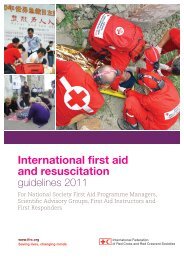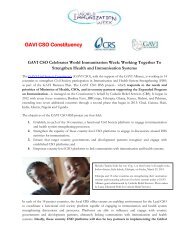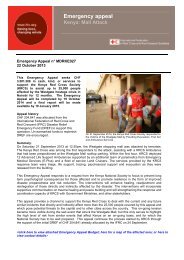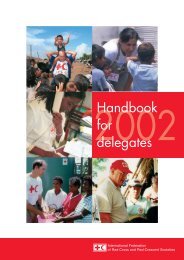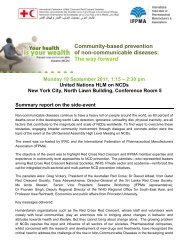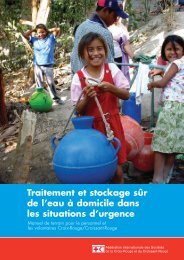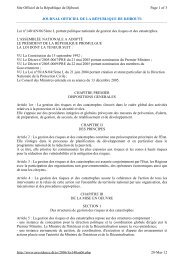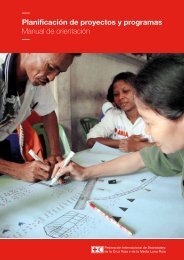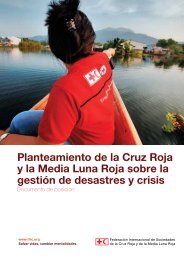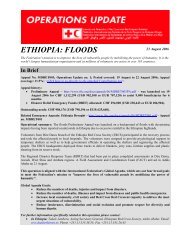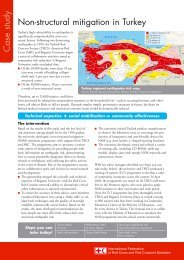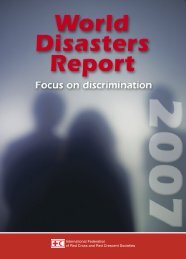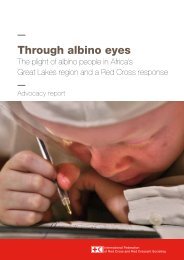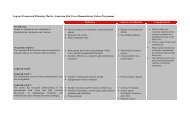World Disasters Report 2010 - International Federation of Red Cross ...
World Disasters Report 2010 - International Federation of Red Cross ...
World Disasters Report 2010 - International Federation of Red Cross ...
Create successful ePaper yourself
Turn your PDF publications into a flip-book with our unique Google optimized e-Paper software.
and in a sense <strong>of</strong> hopelessness for the future. Research also demonstrates that this<br />
systematic segregation <strong>of</strong> the poor entrenches and perpetuates poverty over generations.<br />
One Latin American expert refers to a “dissident conscience” which develops in<br />
marginalized urban communities and is commonly expressed through violence. When<br />
the excluded and the marginalized look around and see business owners evading tax,<br />
politicians buying votes and appointing family members and friends to public posts,<br />
or using public money for personal gain, they lose confidence in the institutions <strong>of</strong> the<br />
state and begin to question what they gain from obeying the law.<br />
Strategies<br />
The recently passed benchmark – more than half the world’s population living in<br />
urban centres – served to focus international attention on a major crisis that has not<br />
been adequately addressed until now. Thus far, solutions to the problems <strong>of</strong> urban<br />
violence have been scattershot and poorly financed, with little in-depth evaluation <strong>of</strong><br />
what works and what doesn’t.<br />
Asking the police and criminal justice system to fix everything may only make matters<br />
worse. A broad-based response looks at better urban planning, effective and inclusive<br />
local governance, community involvement, reform <strong>of</strong> police and judicial systems, education<br />
and jobs for youth, effective international laws against organized crime, disarmament<br />
and gun awareness, and tailored responses to the specific circumstances <strong>of</strong><br />
each particular local context.<br />
Meaningful citizen involvement in local governance is key to reducing urban violence.<br />
The social contract between the state and society is based on an active dialogue about<br />
the expectations that citizens have <strong>of</strong> the state, its capacity to provide services, including<br />
security, and to secure revenue from its population and territory to provide these<br />
services. In addition, because people’s needs and expectations <strong>of</strong> the state evolve over<br />
time and the state’s capacity and resources are impacted by changes in both domestic<br />
and international political and financial conditions, this dialogue needs to be continually<br />
revisited and the agreement updated. A fundamental precondition for an effective<br />
social contract, therefore, is a set <strong>of</strong> effective political institutions and processes<br />
through which the state and its citizens can engage, consult and dialogue to renegotiate<br />
and reinstitutionalize aspects <strong>of</strong> the contract.<br />
As the government representatives closest to the people, strong local leaders can increase a<br />
state’s legitimacy. Local authorities that engage with constituents, respond to their needs<br />
and include them in decision-making can build trust in the community and encourage<br />
inter-group dialogue to ease any tensions. At the same time, community involvement<br />
in urban planning, service provision and violence-reduction strategies increases<br />
the chances that they will work. To ensure they can deliver on their commitments,<br />
municipal governments need to have enough autonomy and resources to act effectively.<br />
<strong>World</strong> <strong>Disasters</strong> <strong>Report</strong> <strong>2010</strong> – Focus on urban risk<br />
85



